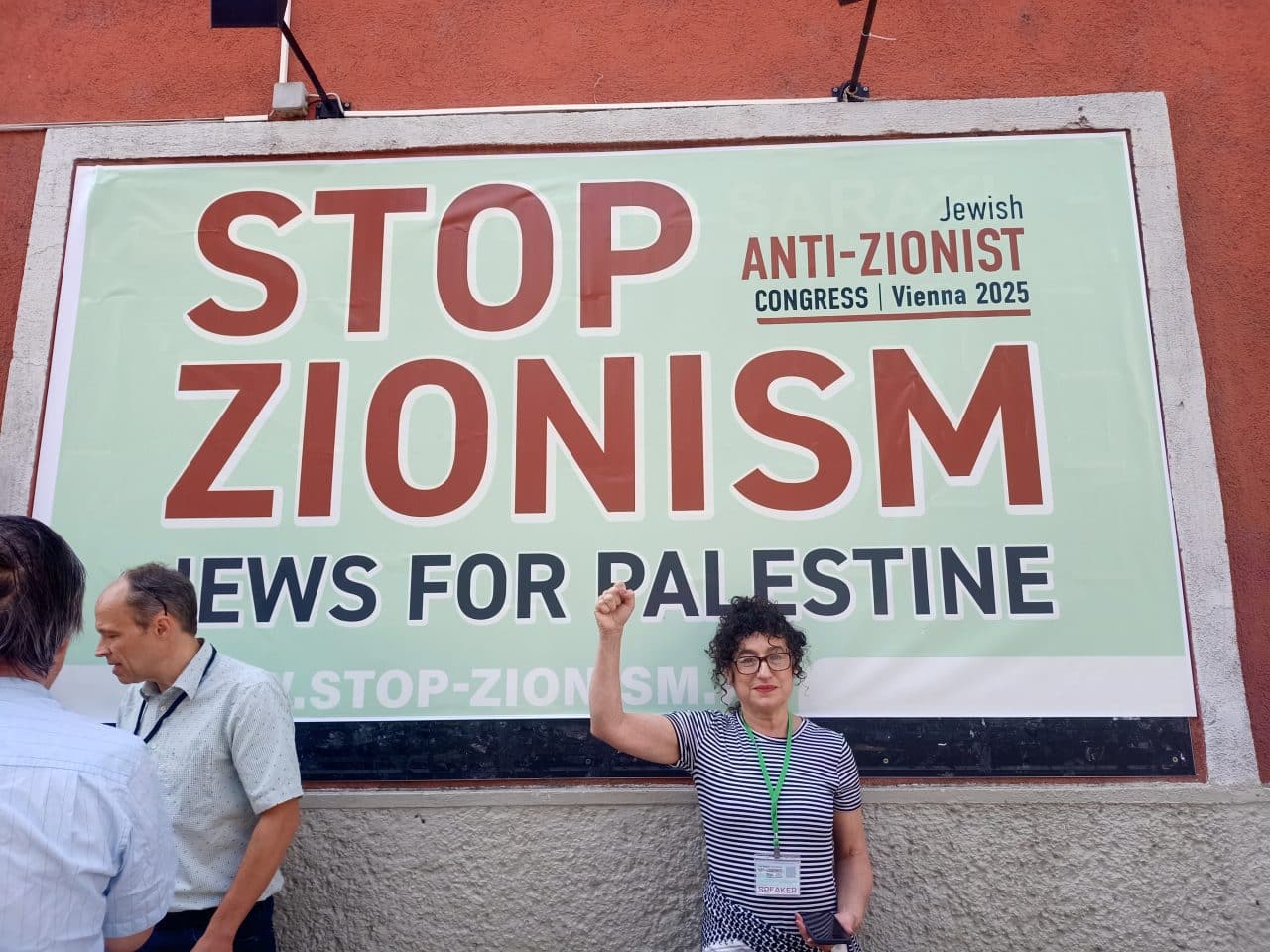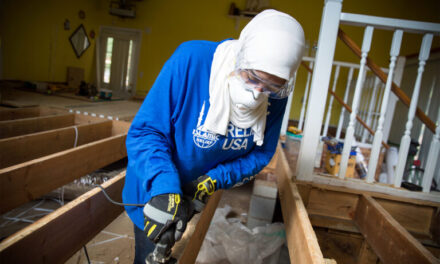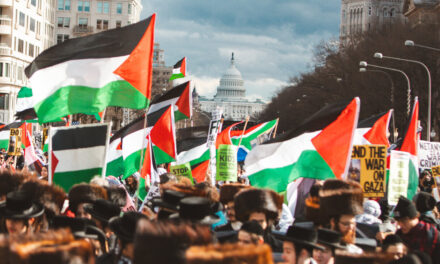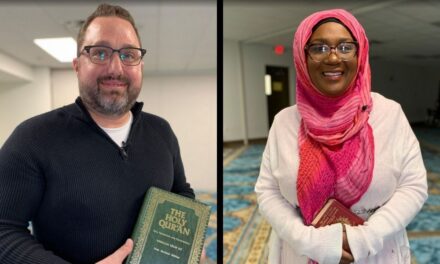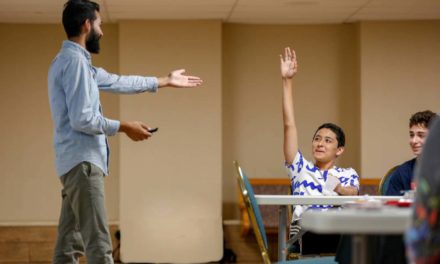A billboard outside the first Jewish Anti-Zionist Conference, which was held June 13-15, 2025, in Vienna, Austria. (Photo: Daniel Friedman)
The decision to hold the first Jewish Anti-Zionist Congress in Vienna was significant for historical reasons – being where Theodore Herzl formed the ideology that became modern Zionism, as well as Adolf Hitler’s birthplace – and for modern reasons – Austria, alongside Germany, provides unconditional support for Israel, a symptom of its guilt over the Holocaust.
Western nations’ complicity in Israel’s ongoing genocide in Gaza has left the supposed ‘rules-based’ order they claim to represent in ruins. The U.S., UK, Europe, and their allies have provided Israel with the means to act with impunity through weapons, which flow freely, and information, which certainly does not.
The Congress began just as Israel was bombing Iran, a reminder of the threat Zionism poses to global stability. Against this backdrop, over 1,000 anti-Zionist Jews and their allies from across the globe met in the Favoriten District in Vienna, June 13-15, 2025, at a time when the tide is turning, too slowly, but turning, against the settler-colonial ethnostate of Israel.
Israel still has its well-funded lobby groups, and far too many people still believe its hasbara. It seems it’s up to a plucky group of not-so-well-funded anti-fascist dissidents in keffiyehs to turn the tide. While we have the truth and international law on our side, at times our goals seem insurmountable. But as several speakers highlighted, we must keep going, and we do not have the luxury of despondency.
I was there representing South African Jews for a Free Palestine (SAJFP) alongside Roshan Dadoo, the conference’s only South African speaker and coordinator of the South African Boycott, Divestment, and Sanctions (BDS) coalition.
SAJFP sent me to Austria to advocate for a united, Jewish Anti-Zionist movement that is inclusive rather than Eurocentric. Our experience in fighting apartheid as South Africans is also significant, in terms of both our successes and our failures. As United Nations Special Rapporteur Francesca Albanese pointed out via live stream: While the political system underpinning apartheid was defeated in South Africa, the economic and social systems that enabled it remained in place.
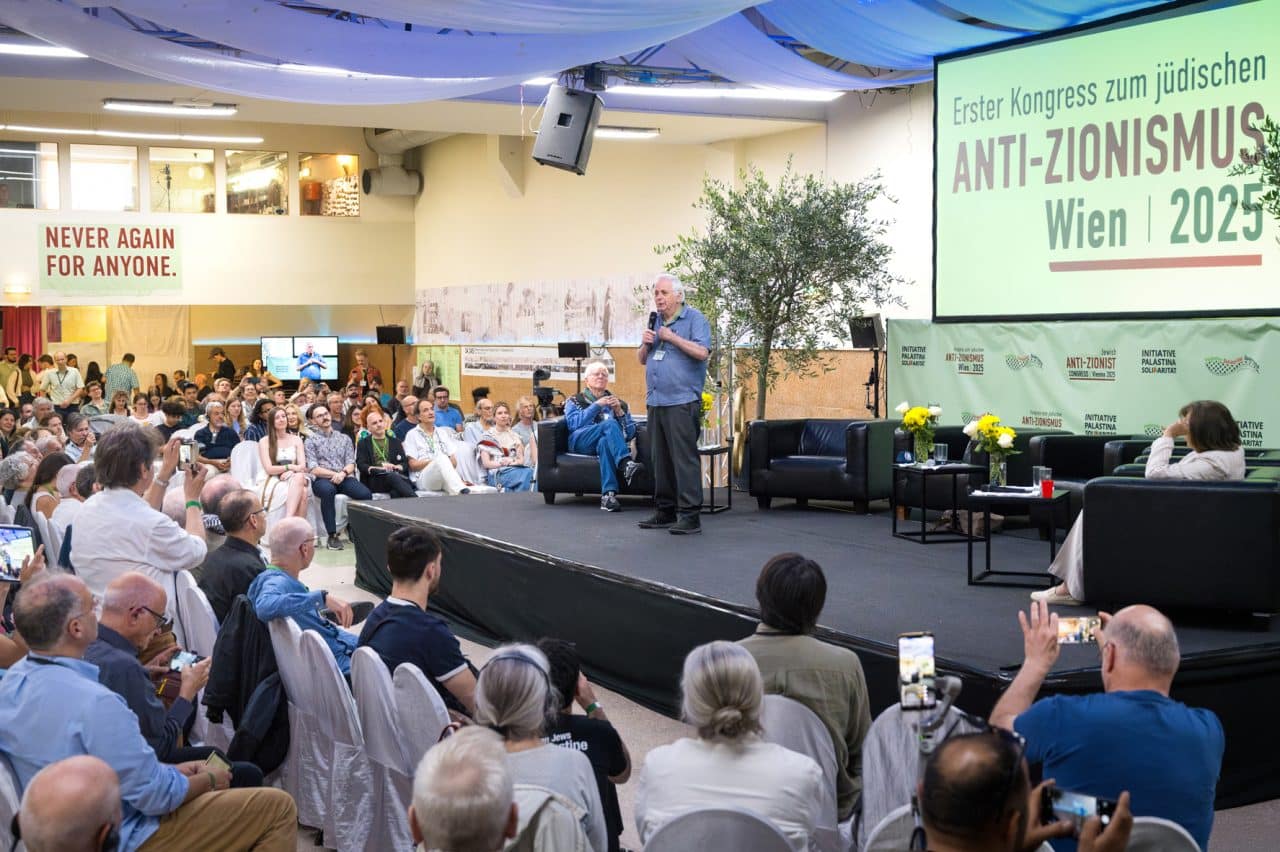
Ilan Pappe addresses the Jewish Anti-Zionist Congress, held June 13-15, 2025, in Vienna, Austria. (Photo courtesy of the Jewish Anti-Zionist Congress)
While the First Congress did not definitively represent the entirety of global anti-Zionism – hopefully, in time it will, as the follow-up Congress is already being planned for 2026 and is rumored to be taking place in Ireland – the turnout showed the movement is alive, well, and growing. Leading Jewish anti-Zionists in attendance included Israeli-born historian Ilan Pappe, U.S. journalist and filmmaker Katie Halper, and Hungarian/British Holocaust survivor Stephen Kapos.
The voice of Palestinians, crucially, was heard there too, through the presence of people such as Gazan journalist and author Ramzy Baroud, who argued that his people should become a model of resistance against imperialism worldwide. Palestinian physician, academic, and writer Dr. Ghada Karmi was there to emphasize the right of return and Europe’s role in having “created the monster” that is Israel, as was politician Awad Abdelfatah, who has worked from within the Israeli political system, advocating for one, democratic state with equal rights for all who live in it.
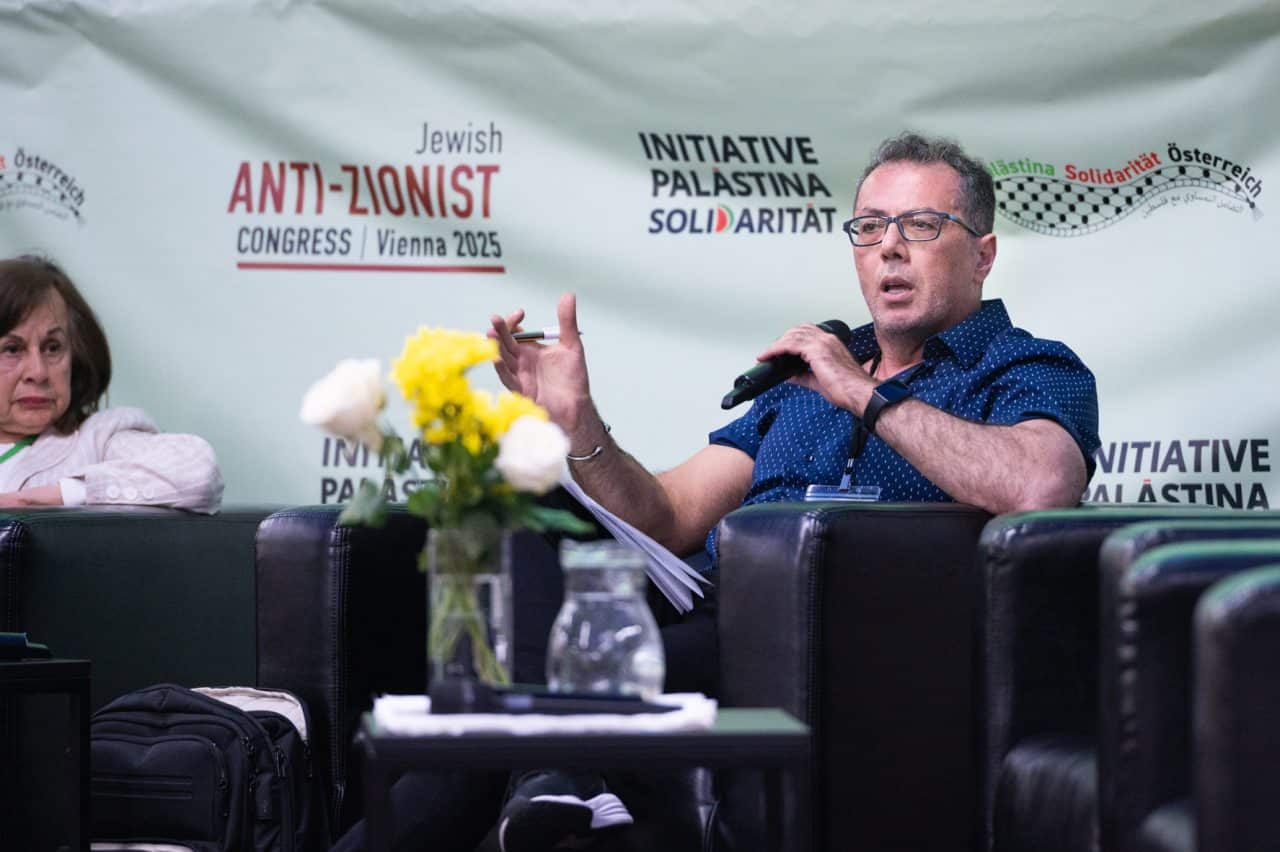
Ramzy Baroud and Dr. Ghada Karmi on a panel at the first Jewish Anti-Zionist Congress, held June 13-15, 2025, in Vienna, Austria. (Photo courtesy of the Jewish Anti-Zionist Congress)
The need to reclaim Judaism from Zionism – once seen as a fringe movement within global Jewry as UK writer and activist Tony Greenstein reminded us during a discussion – was a constant theme at the Congress, as was the need to embrace the Yiddish concept of doikayt, or hereness, the idea that Jewish people can, have and will live peacefully with their neighbors in countries across the globe, rather than needing to escape to a physical homeland.
We were also reminded that we were there not just as Jews, but as human beings, and that there is no place for exceptionalism of any kind in this struggle. We must join forces with anti-Zionists across the globe, and our primary duty is to the Palestinian people. Their suffering was highlighted through a video that made many in attendance emotional, in which a surgeon from Gaza detailed his attempts to keep going amid Israel’s systematic dismantling of the enclave’s entire medical system.
The Congress demonstrated that some of the most effective opposition to the Zionist state comes from those born into it. Together with Pappe, others who were born in Israel or have lived there were heard. These included dissident activist Ronnie Barkan, filmmaker and academic Professor Haim Bresheeth-Žabner, and academic and activist Dalia Sarig. These voices provide hope that it’s possible to resist the propaganda that keeps most Israelis loyal to their state, regardless of its actions.
Some speakers were not Jewish or Palestinian but simply anti-Zionists, reaffirming that this is an issue of common humanity. Alongside Albanese was Egyptian journalist Rahma Zein, providing another much-needed African perspective, and French/Palestinian juror and politician Rima Hassan, who managed to join the Congress virtually, despite having just been released from detention after Israel abducted her and other activists on the Madleen Flotilla.

Rahma Zein speaking on a panel at the Jewish Anti-Zionist Congress, held June 13-15, 2025, in Vienna, Austria. (Photo courtesy of the Jewish Anti-Zionist Congress)
A declaration written with input from all speakers at The Congress seeks to capture the collective positions that were reached during the three days. The declaration condemns the genocide as well as Israel’s apartheid-driven policies, rooted in ethnic cleansing. The document documents Israel’s systematic war crimes in Gaza, “including ethnic cleansing, militarised apartheid, urbicide, scholasticide, medicide, mass starvation”, and condemns Western governments, particularly the U.S., UK, EU, Canada, Australia, and New Zealand, for enabling these actions through military and diplomatic support.
It calls for immediate sanctions, Israel’s suspension from the UN, adherence to BDS (Boycott, Divestment, Sanctions), and nuclear disarmament under IAEA oversight. The declaration also affirms Palestinians’ right to resist occupation and demands an end to Zionist claims of representing global Jewry, urging Jews worldwide to reject Zionism and stand in solidarity with Palestinian liberation.
The signatories reject Israel’s legitimacy as a Jewish state, and note that Zionism is a racist ideology that endangers both Palestinians and Jews. They call for decolonization, the right of return for Palestinian refugees (per UN Resolution 194), and the withdrawal of Israeli forces from all occupied territory since 1948.
The Congress could prove important only if all who attended absorb its message, take it back to our communities, and work hard to grow the movement. The need for greater collaboration between global anti-Zionist groups was evident, as was the need for anti-Zionist Jews to unite as one cohesive movement. Zionism is a highly funded, meticulously organized, and well-oiled machine, and we only have a chance of defeating it together.
To me, more important than anything that came out of the Congress is that it happened, that we united to continue our work, and that it symbolized a return to the roots of Judaism as a religion of peace. Despite all the damage that has been done in our name, Jews can and must be part of building a better world. I believe deep down that a day will come when we truly can celebrate our achievements as anti-Zionists, Jewish or otherwise. But who knows how long that will take? For now, all I really know is that our work has just begun.
